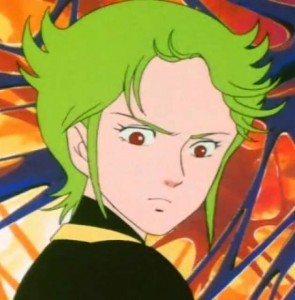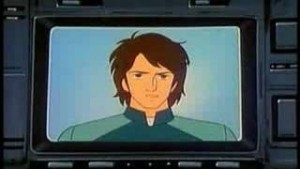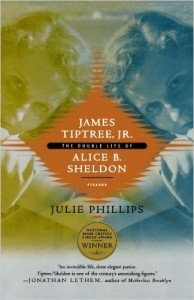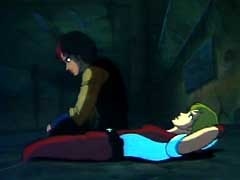Tansy Rayner Roberts's Blog, page 38
August 31, 2015
Hugo, and Livia
 I am just surfacing from yet another spell of illness and bedrest after a long, cold winter of the perpetual Colds and Flus… but there is exciting newsness that really should be formally acknowledged.
I am just surfacing from yet another spell of illness and bedrest after a long, cold winter of the perpetual Colds and Flus… but there is exciting newsness that really should be formally acknowledged.
For a start, we won a Hugo! Galactic Suburbia has featured on every Best Fancast shortlist since the category came into being, and we are beyond excited to have won ourselves a rocket (one each!). It was particularly pleasing to have received so much support from listeners and voters this year – to have the majority of Hugo voters come out in favour of such an openly feminist podcast is fantastic. Alex, Alisa, the Silent Producer and I are all over the moon.
 In other news, my second Livia Day novel, Drowned Vanilla, is now available widely in e-release, so you can purchase it in .mobi or .epub format just about anywhere that sells digital books. Don’t forget you can also download The Blackmail Blend, the tie-in short story, direct from the TPP site.
In other news, my second Livia Day novel, Drowned Vanilla, is now available widely in e-release, so you can purchase it in .mobi or .epub format just about anywhere that sells digital books. Don’t forget you can also download The Blackmail Blend, the tie-in short story, direct from the TPP site.
Speaking of Twelfth Planet Press, don’t forget to pick up a copy of their fabulous, important new release, Letters to Tiptree, edited by Alex Pierce and Alisa Krasnostein. The book not only features a selection of letters by current writers (including me!) addressed to the late Alice Sheldon, and her various secret identities, but also reprints letters between Tiptree and Ursula K Le Guin, discussing the famous reveal of Tiptree’s gender. People are already buzzing about this being a book to consider for the Hugo Best Related Work category next year, so get in and read it ASAP!
Back to Livia again – I’ll be appearing at the Tasmanian Readers and Writers Festival on a crime-writing panel with Michael Robotham and David Owen: Smoking Guns and Dead Leads. I believe this one is booking up fast, so get in if you want a ticket!
If you haven’t checked in with Galactic Suburbia lately, we recorded two Alli Sheldon/Raccoona Sheldon/James Tiptree Jr Spoilerific episodes to commemorate Tiptree month: The Bio and The Stories. You can also hear us squeeing and statbadgering about the Hugo results on Episode 126: The Hugos!
August 28, 2015
Robotech Rewatch 62: Rick Hunter’s Sure Spunky
Warning, Rick Hunter does not appear in these episodes. Or at all. Ever. When the excitable narrator implied otherwise in the ‘next week on Robotech’ at the end of The Midnight Sun, Ms10 (who was on Minecraft and firmly Not Interested in Robotech) perked her ears up.
HER – Is that?
ME – No.
HER – But he said Rick Hunter.
ME – He lied. It’s there to make you think he’s going to be in it.
HER – He’s not in it?
ME – Didn’t I tell you that Rick Hunter never ever comes back?
HER – But maybe?
ME – No.
See? See? Even the modern generation of kids who have access to Wikipedia still get their hearts broken by this damned show pretending that it’s going to follow up on the adventures of the original Robotech crew and then not doing it.
This is a particularly dire example of that.
More cold weather and mountain passes to be travailed. The geography of this place is insane. Weren’t we just at tropical water level five minutes ago?
Princess Sera, meanwhile, is having an emotional meltdown about being into that pretty human boy.
The freedom fighting crew enjoy a mountainside dinner. Lunk really likes steak. This fact cannot be emphasised enough.
Marlene has another of those head-attacks of hers and everyone is smart enough to actually get their weapons out immediately, because she’s totally a belweather for Invid violence. Turns out this is just a panic attack, not a sign of imminent doom. At least, that’s what the crew think, because the Invid squad, led by Sera, are being super sneaky.
Sera struggles emotionally with how hot Lancer is, and fumbles the first sortie, inadvertently warning them as to the Invid presence. (Well, second warning, since Marlene totally warned them already) The pitched battle continues to be punctuated with Sera’s inconvenient emotions.
Also, I really think Lancer should wear some sort of coat, as his off the shoulder number seems inappropriate in the snow.
Marlene, freaked out by the gunfire, starts wondering about the meaning of life. The meaning of life, Marlene, is that if a bunch of giant battle droids shoot each other up on a snowy mountainside, they’re probably going to cause an avalanche.
WHOOSH.
There’s a lot more shooting and a lot more snow. At one point, Lunk actually causes a second avalanche because it wasn’t snowing enough.
Sera faces off against Lancer and Marlene, and is caught in an emotionally fraught staring-and-emoting contest with Marlene. No one wins.
The others come to the rescue, and end up knocking Sera and the other Invid into a frozen ravine.
Rand asks the all-important question of why the Invid didn’t shoot Marlene and Lancer. Scott promptly mansplains a good explanation, which means no one actually suspects her at all. Good covering for your non-girlfriend totally by accident, Scott!
Well, Lancer suspects her, but he’s too busy being nice to Marlene to let it bother him.
Sera watches the gang leave, wondering why she spared them, and why anything.
I’m starting to suspect that the Regis’ problems with effective military intelligence stem from the fact that no one knows anything about anything. This also covers her parenting problems.
Cannot emphasise enough how much this character is not Rick Hunter.
EPISODE 78: Ghost TownAnnie and Rand are cheerful while riding through the arid ‘wild west’ section of the ravaged Earth. The terrain is… awfully flat and dry considering they were only just in the snow last week, though the previous episode did telegraph that they were finally out of the snow and looking forward to travelling on the flat.
Scott wants to make sure that no one gets any genre-specific pleasure at all from the fact that humans have built cowboy themed towns in bomb craters. No fringed cosplay for you, Annie! No fun for anyone, ever. No fun.
Marlene’s role as worst spy ever continues to torment her, as does the extreme ringing in her ears that she gets whenever the Invid are near.
Oops, looks like Rand and Scott are going to get to play cowboy after all – they are arrested by the local sheriff on the grounds that he doesn’t like them, and they’re downright shifty looking.
Also, I’m not sure if I even need to mention this, but every character in this talks like Yosemite Sam.
Lancer, driving Marlene around in the jeep in the hopes that her migraine can provide vital clues as to the whereabouts of the Invid, is stopped by a bunch of cowboy-talkin’ varmints and promptly decides to a) pretend he and Marlene are honeymooners and b) mimic their accent.
Tourists, never mimic the accent of the locals. Never. It’s embarrassing for everyone.
The varmints, who are possibly crazy as loons, given their tendency to laugh broadly at just about everything, lead Lancer and Marlene to a crashed battle fortress. An SDF-what now?
The fortress has the words Mars Force written on it (um, okay) and when Lancer tries to discover if it’s the SDF3 and if it has anything to do with Admiral Rick Hunter, they all play dumb at him.
Scott is furious at being arrested by the cowboys of cowboy town, especially when his and Rand’s abandoned Cyclones are promptly ‘rustled’ by local kids.
Lancer’s varmints turn out to be veteran soldiers who were part of Admiral Hunter’s original SDF3 expedition, then returned after the second Robotech war only to drop out of society and get into weapons profiteering.
Lancer is horrified by the traitorous happiness of these deserters, and learns that they have been receiving messages from Admiral Hunter, which they have been ignoring. What, you mean we might (no) actually get to hear a message from our baby Rick (no), are we talking actual proper inter-Robotech continuity here? (no)
To prove that Marlene isn’t the only terrible spy, Lancer inadvertently gives away that her head is full of Invid signals, which makes the horde of varmints suspect (half correctly) that they are Invid spies.
Lancer snogs Marlene to prove that they’re not aliens, which… okay, I’m pretty sure that only proves they’re not Zentraedi, surely not all aliens are kiss-adverse? Anyway, it’s a thinly veiled excuse to ship Lancer and Marlene for one episode – wow, the boys are all lining up for her, aren’t they? Scott has been too slow with his agonised stalker routine, and she’s practically going steady with both Rand and Lancer now.
The floppy haired dude on the screen (who looks enough like Rick Hunter that you think – maybe for a moment – but NO) tells the base that Rick Hunter is planning to attack the Earth and is calling on all survivors to destroy military targets. Oh, it’s like Rick’s personal assistant. Well, that’s nice.
One of the varmints replies cheerfully “Rick Hunter, he just won’t give up,” and another agrees, “He’s sure spunky like that.” This is the best bit of the episode.
I like the detail that these boys were in the SDF forces so long ago that they don’t even think of Rick as an Admiral and have no proper military respect for him. Because, remember when he was just that 16 year old kid who liked planes and was drafted and kept getting promoted a lot? Good times. (also why do we never hear any shout outs to his wife Admiral Hayes-Hunter, who was totally promoted before him and should be further along the military track?)
Gabby, one of the veterans (so named because he’s silent, haw haw) takes his battle armour and goes to attack the Invid, promptly getting himself killed after a whole episode of brooding and trying to fix the communications array. It turns out that his son is Rick Hunter’s personal assistant, AKA the dude sending them messages from Admiral Hunter’s fleet. Because apparently it’s always been the same kid doing that job, and it was Gabby’s only way to see his son even though he could never talk back to him.
It’s all a bit tragic, and enough to inspire the varmints to get their act together and get their old battle fortress (really a WHOLE BATTLE FORTRESS?) up and running again.
Those crazy old coots have got the junkheap off the ground! Also, Rand is both ‘sonny’ and a young whipper-snapper. I feel this should earn him some cowboy points of some kind. If he gets called whipper-snapper three times, he gets to be sheriff, right?
A bunch of stuff gets blown to kingdom come, cowboy style.
I choose to believe that the cranky codgers are Konda, Rico and Bron. Except for the one who is obviously Nobby from the Discworld novels.
They all get themselves killed, of course.
Man, this end of the show is kinda bleak.
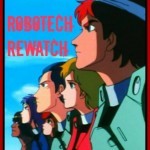 This weekly rewatch of classic animated space opera Robotech is brought to you as bonus content for the Musketeer Space project.
This weekly rewatch of classic animated space opera Robotech is brought to you as bonus content for the Musketeer Space project.
Thanks to everyone who has linked, commented, or sponsored me.
You can support the blog at Patreon.
August 25, 2015
2. Diane Marchant & Kirk/Spock [SF Women of the 20th Century]
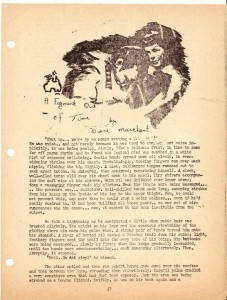 Fanfic, and slash fiction in particular, is a huge part of SF fandom history – and its overlapping communities have mostly been built and shared by women.
Fanfic, and slash fiction in particular, is a huge part of SF fandom history – and its overlapping communities have mostly been built and shared by women.
Diane Marchant is generally regarded as the writer of the first published fic featuring Kirk/Spock – the ship which popularised slashfic as a fan phenonenon. And she was Australian, to boot!
You’re welcome, rest of the world.
The story, “A Fragment Out of Time,” published in Grup #3 in 1974, contained a steamy sex scene but named no names (and played the pronoun game, so it wasn’t even clearly marked out as a m/m relationship).
Still, the piece was illustrated with a Kirk & Spock picture drawn by Diane, making her intentions fairly obvious, and a cartoon underneath the final page of the story shows Bones saying to Kirk: “Impossible….. No, Jim. I warned you about messing with aliens…….. especially Vulcans.” (The look on Kirk’s face in the cartoon implies he has just been told about the existence of slash fiction. Oh, sweetie.)
Diane wrote a followup meta-essay in Grup #4 entitled: “Pandora’s Box… Again: A Psychological Discussion of the Relationship Between Captain James T. Kirk and Conmander Spock.” This essay explicitly confirmed that her story was about Kirk and Spock, and discussed the idea that many fans had been chatting and privately writing about for some time: the Kirk/Spock relationship could be read as a love story.
(the term Kirk/Spock including the all important slash symbol which gave slash fiction its name is thought to have been coined around this time, with Connie Faddis’ review in The Halkan Council #12 of Diane Marchant’s essay including one of the earliest published uses of the phrase)
“Pandora’s Box… Again,” early toe in the water of slash fandom that is is, presents the theory that Spock would not think he is human enough to meet the emotional needs of a human woman, or Vulcan enough to provide whatever it is that Vulcan women need. The logical extension of this, therefore, is for him to find love among his male colleagues:
“He had to love someone, he was human enough for that; although his Vulcan side would not permit the terminology ‘love.’ What to call it then? Simple! Call it ‘Vulcan loyalty’ to a superior officer. Hidden, beyond that self-deception, Spock can happily love Kirk all he wants and not feel that it is un-Vulcan…”
Spock expresses his love for Kirk in TV canon largely through risking his life to save his captain. And possibly that thing with the eyebrows.
“Then the letters started arriving…. Whee…. Phew!!!” is how Diane describes the fan response to “A Fragment Out of Time.” Decades later, she declined to have her story reprinted for the Foresmutters Project, which provided a digital archive of the earliest fanfic (mostly K/S slash) from paper zines. It can, however, be found on Tumblr and various other archives on the internet.
In an interview with Diane shortly before she died in 2007, she modestly refused to take any credit for the Kirk/Spock phenomenon:
“Really, I had nothing to do with the initial concept, as it was there unfolding on our screens as we watched our beloved Star Trek. Me, well—I just accepted a challenge and attempted to subtly present the idea deftly (with slight humorous overtones) as a scenario which most could find acceptable at that time.”
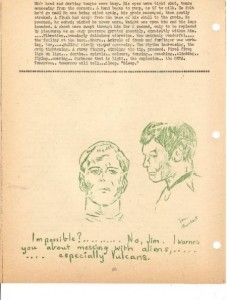 Fanfic around Star Trek was very active in the 1970’s, as the cancellation of the show in 1969 had left many fans bereft, and creative. “Dirty Old Broads” was a term used and embraced by many female fans who enjoyed creating and sharing sexually explicit fan art and writing. Grup itself was the first R-rated Star Trek zine (produced by mimeograph!) was known for its adult content even before becoming Ground Zero for slash. Grup #2, for example, featured an actual fold-out centrefold poster featuring fan art of George Takei’s Sulu. (Takei has not only seen and occasionally autographed this particular piece of saucy artwork, but complimented the artist.)
Fanfic around Star Trek was very active in the 1970’s, as the cancellation of the show in 1969 had left many fans bereft, and creative. “Dirty Old Broads” was a term used and embraced by many female fans who enjoyed creating and sharing sexually explicit fan art and writing. Grup itself was the first R-rated Star Trek zine (produced by mimeograph!) was known for its adult content even before becoming Ground Zero for slash. Grup #2, for example, featured an actual fold-out centrefold poster featuring fan art of George Takei’s Sulu. (Takei has not only seen and occasionally autographed this particular piece of saucy artwork, but complimented the artist.)
Star Trek’s popularity and recognition-factor outside science fiction circles meant that academics with an interest in slash fiction have often used it as a reference point, so academic critical discussion of slash is highly Kirk/Spock-focused, despite other fannish pairings having since eclipsed it in popularity.
The article “A Short History of Kirk/Spock Slash,” points out the irony of the first sentence in Diane’s story, spoken to the character believed to be Spock: “Shut up… we’re by no means setting a precedent.”
———
PS: while we’re talking about Kirk/Spock, let’s give a shoutout to Delia Van Hise, who wrote Killing Time, an official tie-in Star Trek novelisation that was published in Pocket Books in 1985. The original manuscript included slashy Kirk/Spock references and Paramount requested they be edited out… but because the books were in the process of an editorial handover, it went to print as originally written. 250,000 copies were printed, and at least 100,000 were distributed to stores before the book was recalled and revised. The original editions are collector’s items now!
SF WOMEN OF THE 20TH CENTURY is brought to you by Tansy’s supporters at Patreon.
August 21, 2015
Robotech Rewatch 62: Awkward Shirtless Holiday Camp
Keep your scanner tuned to this station. Robotech is back!
EPISODE 76 – Metamorphosis.
Marlene (AKA Ariel) is the worst infiltrator ever, because she has failed to send any spyware back to the Invid Regis.
The Regis transforms two other Invid using ‘biomass reconstruction’ which turns them into conventionally attractive humanoids with adorable hair: Sera and Corg.
She believes that the humanoid form has been categorically proven to be the most flexible and useful life form for surviving this planet, based largely on that time all her dinosaurs got blown up. Cute hair for the win!
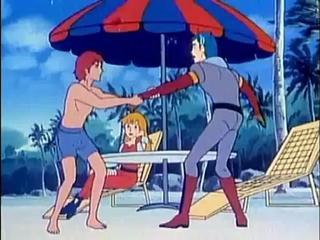 Our freedom fighting bikie gang are relaxing on a tropical island (bwuh?) because beach time = not throwing hissy fits and quitting the team. Annie finds an abandoned military base from the Second Robotech War, and they get scavenging on the grounds that a boat might be more surprising in their planned attack on Reflex Point than a fighter plane.
Our freedom fighting bikie gang are relaxing on a tropical island (bwuh?) because beach time = not throwing hissy fits and quitting the team. Annie finds an abandoned military base from the Second Robotech War, and they get scavenging on the grounds that a boat might be more surprising in their planned attack on Reflex Point than a fighter plane.
Turns out Rand is pretty good at welding. Who knew?
When Rook is injured badly in a skirmish with a patrol, they promptly find themselves an abandoned paradise resort where she can rest up while they swim, frolic and fix up a bunch of mecha.
Rook is a bit of a grinch about fun in the sun, but a shirtless Rand eventually convinces her to enjoy their impromptu holiday.
Lancer finds a secluded grotto in which to have one of his many sexy washtimes, this time in a waterfall. A large candy pink Invid (it’s a GIRL) spies on him… A little while later, Lancer is startled by Sera, a pretty girl with green hair, red eyes and candy pink armour. They have a waterfall wrestle together and she won’t answer any of his questions.
Rand can surf. Scott, meanwhile, refuses to even take his flight suit off. Shirtless Rand cannot be defied, though, and drags him fully dressed into the water. Turns out Scott can’t swim because of that pesky ‘spent his whole life in space’ business. He is horribly awkward and doesn’t want to do it at all.
Rand promises to teach him, which turns out to mean repeatedly ducking and laughing at him. Scott doesn’t take his shirt off, because it turns out the only thing more awkward than being shirtless at the beach is being thrown in the surf while wearing your flight suit.
Annie laments her tragic love life and her fears of becoming an old maid, while she passes wrenches to Lunk who is busy repairing the love of his life, his jeep. He promises her that she’s enough of a heartbreaker to get married five or six times, which she takes as a great compliment, because she’s Annie.
Lancer pursues the pretty mysterious Sera only to find her abandoned mecha. Despite the fact that it is the exactly same candy pink colour as her armour, he refuses to believe it could be hers until she leaps into it and flies away. Co-ordinating beautifully, by the way.
The gang end up in a massive battle against the Invid, and weirdly Lancer (now piloting the love boat instead of his usual fighter) keeps referring to the attacking Invid as ‘he’ and ‘buddy’ even though he knows that the pink one is piloted by a girl.
Ah well, I guess gender-queering goes in all kinds of directions.
Sera fails to shoot the humans because seeing Lancer makes her go all teary and emotional which… ugh, okay.
Now able to fight on land, air and sea, the freedom bikie crew head off on their continual quest to go do a thing at Reflex Point maybe someday.
 This weekly rewatch of classic animated space opera Robotech is brought to you as bonus content for the Musketeer Space project.
This weekly rewatch of classic animated space opera Robotech is brought to you as bonus content for the Musketeer Space project.
Thanks to everyone who has linked, commented, or sponsored me.
You can support the blog at Patreon.
Where Have All The Friday Links Gone
 My Fridays are so much more jam-packed than they used to be so Friday Links have fallen by the wayside. Whoops! I have so many juicy bits and pieces saved up, though, I had to do one today.
My Fridays are so much more jam-packed than they used to be so Friday Links have fallen by the wayside. Whoops! I have so many juicy bits and pieces saved up, though, I had to do one today.
Judith Tarr visited Charlie Stross’s blog to ask the question Where Have All The Women Gone – or, more precisely, to talk about why that question is so damaging.
Also on Charlie’s Diary, Nicola Griffith brought the stats to the party with her post Data, books and bias looking at the gender breakdown of awards versus how seriously those awards are taken. Stirring stuff that will be super useful for Alisa’s thesis.
Some Australian SF Year’s Best Tables of Content! Fablecroft’s Focus 2014 collects an elite selection of work which has received acclaim via national and international Awards recognition. Over at Ticonderoga, Liz Grzyb and Talie Helene have compiled the TOC for The Year’s Best Australian Fantasy and Horror. I’m honoured to be in both books, with two different stories – Focus is taking “Cookie Cutter Superhero” and Ticonderoga are taking “The Love Letters of Swans.”
My thoughts are on women’s role in the history of science fiction right now, so I was delighted to read Vonda McIntyre’s post at the Women in Science Fiction website, talking about “Starfarers,” the best long-lost SF TV show of all time. A diverse cast, an original premise (university faculty steal a starship when their travel funding is cut) and unusual aliens… oh and it was totally a hoax she made up in order to get through a dull panel topic at a convention. It has its own fandom. Oh, SF community, this is why we still love you.
While you’re at the Women in Science Fiction site, stop and take a look around if you haven’t already. Kristine Kathryn Rusch is working on a fantastic-sounding anthology on the history of women in the field, and the blog is there for her to muse on her reading as she works through story selection, and features some great guest blogs and thoughtful pieces about particular works which may or may not have been forgotten by the SF world at large. There’s also a Storybundle!
This in-depth report presents what happened when a recent panel on Writing Women Friendly Comics was hijacked by its moderator, Bill Willingham, who felt he had more to say on the topic than the panellists, and indeed women generally. How not to moderate, people!
Kate Elliott’s first ever YA novel, Court of Fives is out and I’m reading it already and it’s wonderful! Natalie Zutter looks at Court of Fives and the Importance of Making Race Explicit in YA Fantasy
Charlie Jane Anders on The Islamic Roots of Science Fiction
Leah Schnelbach on how Diana Wynne Jones Subverted Fantasy Even as She Celebrated It
The Mary Sue asks, Why Can’t We Have Bisexual Male Crime Heroes?
This version of the Fantastic Four is officially my favourite.
Stonewall veteran Miss Major speaks her outrage about the new Stonewall movie. This is an extraordinary interview with a legendary black trans elder who is powerfully furious about how trans-people and people of colour has been dropped from the narrative of LBGT history – at some point she rails against the very white statues which have been built to commemorate the Stonewall riots and suggested they be painted to depict true diversity – a couple of anonymous activists promptly did so, a few days later, in her honour.
Matt Fraction’s Hawkeye Works Because It’s Written Like Great Fanfiction. If Marvel feels the need for a coffee shop AU comic featuring Young Avengers, Misty Knight and Squirrel Girl, they can totally call me!
August 18, 2015
1. Raccoona Sheldon & “The Screwfly Solution” [SF Women of the 20th Century]
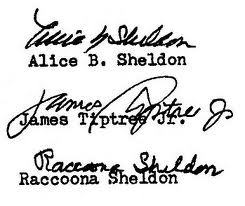 I’m feeling a bit defensive about Raccoona right now, after re-reading the excellent biography James Tiptree, Jr.: The Double Life of Alice B. Sheldon by Julie Phillips. Like many people, I’d always got so swept up in the Tiptree legend that I let Raccoona fall by the wayside.
I’m feeling a bit defensive about Raccoona right now, after re-reading the excellent biography James Tiptree, Jr.: The Double Life of Alice B. Sheldon by Julie Phillips. Like many people, I’d always got so swept up in the Tiptree legend that I let Raccoona fall by the wayside.
But she’s terribly interesting, particularly in light of a recent article about the different reactions that an author received from agents who received her manuscript as being authored as a man, or as a woman.
Writing science fiction under the name James Tiptree Jr from 1967, Alice “Alli” Sheldon quickly became known as an important, groundbreaking writer in the field. She did her networking via correspondence, often by writing fan letters to her fellow writers, though she was also befriended by many editors who encouraged “Tip” in his work early on, giving personal feedback and demanding more work from him as his reputation grew.
Julie Phillips, in the epic biography James Tiptree, Jr.: The Double Life of Alice B. Sheldon, tells the anecdote of how Harlan Ellison rejected a couple of Tiptree’s trunk stories from Again, Dangerous Visions in 1969, and gave the writer a second chance along with an ultimatum: “You can do better than this, and I expect you to do so.” In a later letter, he instructed Tiptree to write something that was “brilliant,” to “bust your ass” and demanded: “A story on which to build a first-rank reputation. The best story you ever wrote.”
Inspired and challenged, Sheldon wrote “The Milk of Paradise,” a story that Ellison not only published but raved about directly to Tiptree: “You are the single most important new writer in science fiction today. Nobody touches you! Not me, not Delany, not Blish, not Budrys, not Disch, not Dick…”
Raccoona Sheldon came into existence in 1974, so that Alli Sheldon could have an outlet for stories that felt more overtly female (Tiptree was acclaimed as a male feminist and an ally to women, but still mostly wrote fiction from the masculine point of view). Where Tiptree had been quickly embraced and supported in building his career as an Important Science Fiction Writer, Raccoona struggled to make an impact on the same editors. There was no one leaping forward to mentor Raccoona, to nurture her as a talent and shepherd her towards greatness – not in the way that the editors had pushed and supported Tiptree. Today, she is barely remembered except as a shadow of the larger Tiptree reputation.
She eventually became her own mentor, having Tiptree write cover letters for “his student” Raccoona, in order to have editors take her seriously.
In 1976, three weeks after the death of her mother, Alli Sheldon sat down and wrote “The Screwfly Solution,” a dark piece of science fictional horror about difficult mother-daughter relationship against the backdrop of a worldwide pandemic of male violence against women. This was a Raccoona story, not a Tiptree piece, and on the day she went to post it to Analog (with a cover letter from Tip to help it along) she received a letter warning her that her secret of Tiptree’s identity was out. The next several months were poured into letters and phone calls, trying to save her professional friendships and relationships, one confession at a time, before the news became public.
While many of her friends and colleagues were openly supportive of Tiptree being outed as a woman (and in a minor chord, Raccoona as Tiptree), Alli herself lost all confidence in “Tip’s” voice as a writer and even as a friend and correspondent. He felt lost to her, and her depression overwhelmed her.
In the midst of all this, Tiptree won a Hugo for “Houston, Houston, Do You Read?” and Raccoona’s “The Screwfly Solution” was published in Analog in 1977. The following year, it was Raccoona, and not Tip, who won a Nebula.
“The Screwfly Solution” didn’t only appeal to the close-knit SF writing community – the film rights were first sold in the 1980s, though it wasn’t until 2006 that it was adapted into a made-for-TV film as part of the Showtime’s Masters of Horror series.
Raccoona Sheldon was designed to be Alli Sheldon’s “real” writing voice, the woman who could slide in and replace Tiptree in the hearts and minds of his many admirers, allowing her to quietly kill off the first identity. But the idea of being seen a female writer (as opposed to a writer) was something that Alli always struggled with, and in the legend that is James Tiptree Jr, Raccoona seems to have come a distant third. These days, her stories are all folded into the same bibliography, as if it was all Tiptree, rather than a separate body of work.
“The Screwfly Solution” is Alli/Tip/Raccoona on a plate, down to the character-building through letter writing, the male-female psychological divide as a form of horror, the dark looming threat of barely-suppressed and wild violence and of course, aliens. It’s ominous, awful, and displays startling humour in the face of the apocalypse (the last line is a killer) as well as a touch of savage sexuality.
As the last piece of fiction Alli Sheldon wrote before her identity was revealed, I think it’s worth noting that the male narrator of “Screwfly” (who feels like nearly every male Tiptree hero ever) begins the story, but is eventually taken over and replaced by his wife, through letters and glimpses and then finally in very intense first person voice. She is the real protagonist, and the “final girl” left standing.
The centenary of Alice Sheldon’s birth is coming up on August 24, 2015. That gives you time to read & review one of Tip or Raccoona’s stories, if you are so inclined. You can also pre-order Letters to Tiptree, from Twelfth Planet Press.
LINKS & BOOKS:
Her Smoke Rose Up Forever (SF Masterworks) by James Tiptree Jr is an excellent collection of many of Tip & Raccoona’s most famous and critically acclaimed stories.
James Tiptree, Jr.: The Double Life of Alice B. Sheldon by Julie Phillips
Meet Me At Infinity includes some other less-reprinted stories and career ephemera.
Galactic Suburbia put up a podcast discussion of the Phillips bio for Tiptree month.
Nicola Griffith’s Letter to Alice Sheldon
Brit Mandelo’s Letter to James/Alice (and sometimes Raccoona). Brit also posted about Tiptree/Sheldon’s most memorable stories as good places to start reading them.
Abigail Nussbaum reviews “The Screwfly Solution” short story and film together.
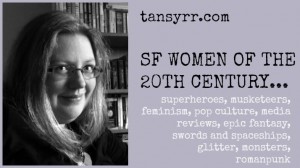 SF WOMEN OF THE 20TH CENTURY is brought to you by Tansy’s supporters at Patreon. You can pledge for as little as $1 a month and contribute towards some exciting upcoming milestones as well as earning all manner of rewards, some of which aren’t even metaphorical.
SF WOMEN OF THE 20TH CENTURY is brought to you by Tansy’s supporters at Patreon. You can pledge for as little as $1 a month and contribute towards some exciting upcoming milestones as well as earning all manner of rewards, some of which aren’t even metaphorical.
August 17, 2015
SF Women of the 20th Century: Introduction
Regardless of when you think science fiction started, and how far back you want to trace its origins (cough, Mary Shelley, cough, Verne and Wells, cough, Margaret Cavendish, cough, Lucian), the 20th century was undoubtedly a time of great development for science fiction as a recognisable genre. SF was in the pulp magazine, in the cinemas, on our radios and televisions, in novels and comics and artwork and fanzines and jewellery and action figures and glam rock.
And while 20th century science fiction is so often framed as a masculine genre, as a sexist genre, as a boys club, and as a hub of male geekery, male childhood, male second childhood and a world peopled by old white men, it was always a place where women existed, and worked, and played, and created wonderful things.
The history of women’s participation in science fiction is often troubling and problematic and difficult to talk about, and enraging, and inspiring, and so many other things. But most often, the history of women in science fiction is forgotten. (Too often, it ends up being a conversation about ‘where are the women in science fiction’ which is pretty insulting to those who were standing there in front of you all along, as Judith Tarr describes in her recent essay Where Have All The Women Gone?)
History is a living, dynamic thing, and we shape it as people when we decide what is important and what is not.
I think that the women who helped to shape science fiction over the 20th century are pretty damned important, so I’m going to blog about some of them over thea next few months. Actually, my plan is to blog about a lot of them, because it’s amazing how many women get dropped out of the conversation after a single female name has been acknowledged. It also means I won’t feel as much pressure to write massive, sprawling essays about the Important Women – I’d rather write a wide variety of shorter pieces which can include the fun, silly and downright interesting corners of science fiction where women have been involved along with the award-winning fiction and critical contributions and so on.
Blog posts are pretty terrible ways to convey an entire person’s life story or science fictional significance (I thought about writing a post about James Tiptree Jr and my head exploded, because that’s a book worth of information and Julie Phillips already wrote it), so I’m going to focus on a single piece of work, event or contribution.
If you have any suggestions of recommendations of particular women for me to talk about, I’d welcome the feedback, though I promise nothing. I’d particularly appreciate suggestions of women of colour, women from non-English speaking countries, for the sake of as much variety as possible.
Come back tomorrow to find out who I’ll be talking about first! (or, you know, guess in the comments)
SF WOMEN OF THE 20TH CENTURY is brought to you by Tansy’s supporters at Patreon. You can pledge for as little as $1 a month and contribute towards some exciting upcoming milestones as well as earning all manner of rewards, some of which aren’t even metaphorical.
August 16, 2015
Galactic Suburbia Spoilerific – James Tiptree, Jr.: The Double Life of Alice B. Sheldon by Julie Phillips
We’re really proud of this episode! Some serious in depth crunchy conversation to be had. Also, Skype us with feedback! You know you want to. Stream or download the episode directly here or via iTunes.
In which we celebrate Alli Sheldon’s centenary with the first of our James Tiptree Jr spoilerific episodes and stand in awe of her extraordinary life, and the hard work of her biographer, Julie Phillips.
James Tiptree, Jr.: The Double Life of Alice B. Sheldon by Julie Phillips
It’s Tiptreemonth, and this spoilerific is a bit different from our usual ones because we’re focussing on a biography – Julie Phillips’ biography of Alice James Raccoona Bradley Davies Tiptree Sheldon. Her life sounds a bit like a novel and it’s all the more amazing for being real…
Join us for our next episode when we talk about some of Tiptree’s short works, including
Houston, Houston, Do you Read? and
“Your Faces, O my Sisters! Your Faces filled of Light!”
(both are available in the Tiptree collection Her Smoke Rose Up Forever, and Tansy particularly recommends the ebook which is nicely laid out)
IMPORTANT ANNOUNCEMENT: Galactic Suburbia now has Messagebank on its Skype number, so you can leave us audio feedback. I know, right??? This month, we would particularly appreciate comments about your favourite Tiptree work, thoughts on the Julie Phillips biography, or on the short fiction we’ll be discussing later this month. We would love to be able to include your audio feedback in future episodes (so make sure to let us know if your comment is not something you wish to be broadcast).
03 90164171 (within Australia)
+613 90164171 (from overseas)
You can order the upcoming Letters to Tiptree from Twelfth Planet Press – a selection of thoughtful letters written by science fiction and fantasy’s writers, editors, critics and fans to celebrate her, to recognise her work, and in some cases to finish conversations set aside nearly thirty years ago. The book also contains archived letters between Tiptree and some of her dearest correspondents.
Please send feedback to us at galacticsuburbia@gmail.com, follow us on Twitter at @galacticsuburbs, check out Galactic Suburbia Podcast on Facebook, support us at Patreon; and don’t forget to leave a review on iTunes if you love us!
August 15, 2015
Robotech Rewatch 61: Underground Dirtbike Break Up Song
“Yes, Rand, the apocalypse is a bad time and place to confess your feelings. Always.”
Keep your scanner tuned to this station. Robotech is back!Episode 75 – Separate Ways
Having successfully ditched Annie with that random jungle tribe (and not asking nearly enough questions about why there would be a random jungle tribe in a community that’s only been post-apocalyptic quite recently), Scott and Rand and Rook and Lunk and Lancer and Marlene do their thing in an abandoned city – their thing being fighting Invid a lot, and complaining that they’ve almost run out of protoculture.
Marlene hasn’t contributed much lately, but she rides on the back of Lancer’s bike, presumably because he’s the character least likely to sexually harass or be mean to her.
In a skirmish, Lunk’s beloved jeep, which has until recently been able to do anything a lightweight motorbike can do, gets crushed in a rockfall. Twice.
They end up stranded underground in an abandoned subway, and Lunk is so devastated at the loss of his jeep (and their imminent deaths) that he physically attacks Scott, enraged at his obsession with Reflex Point.
Lancer brings Lunk back to reason with a light punch, and points out that it was Rand, not Scott, who led them down to this particular deathtrap. Rand happily agrees, and gets punched in the face.
Everything gets pretty messy after that, mostly because Lunk has lost all confidence in his ability to be part of a team, and everyone else is pretty pissed off.
They separate to look for exits, and Rand and Rook pair up because they haven’t had a good fight lately. She admits she has been thinking of leaving the bikie gang, and he is worrying about whether he’s going to be the next one to crack up.
She suggests that the two of them go off together to find more allies, and Rand takes this as a good excuse to declare his love for her, which makes her throw up her hands in impatience. She was talking about strategy, not relationship stuff, ugh, Rand!
They explode their way out of the subway, fight Invid, and make it into the fresh air only to be confronted with a bright and cheerful Annie who brushes off all questions about what happened (“can you see me as a jungle princess?”) which suggests it was actually horribly traumatic.
Rand and Rook break it to her that they’re splitting from the group, which devastates Annie. They expect the others to all give up, but they instead rally around Scott in his stupid plan to press on to Reflex Point. Rook insists on riding off anyway, but with a little nudging from Rand, decides she can’t abandon her friends after all.
There’s a lot of riding in the rain. It’s very emotional.
 This weekly rewatch of classic animated space opera Robotech is brought to you as bonus content for the Musketeer Space project.
This weekly rewatch of classic animated space opera Robotech is brought to you as bonus content for the Musketeer Space project.
Thanks to everyone who has linked, commented, or sponsored me.
You can support the blog at Patreon.
August 11, 2015
Uncanny Magazine Year Two: The Return of the Space Unicorn
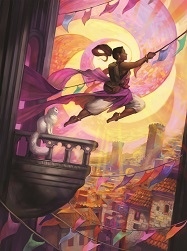 THE KICKSTARTER IS LIVE! 40% already, and the first day isn’t over yet.
THE KICKSTARTER IS LIVE! 40% already, and the first day isn’t over yet.
Three-time Hugo Award-winner Lynne M. Thomas (Apex Magazine, Chicks Dig Time Lords, Glitter & Mayhem) and three-time Hugo Award nominee Michael Damian Thomas (Apex Magazine, Queers Dig Time Lords, Glitter & Mayhem) are launching a Kickstarter for Year Two of their professional online SF/F magazine: Uncanny: A Magazine of Science Fiction & Fantasy. Each issue contains new and classic speculative fiction, fiction podcasts, poetry, essays, art, and interviews. Uncanny Magazine is raising funds via Kickstarter to cover some of its operation and production costs for the second year, with an initial goal of $18,700. The Kickstarter launched on August 11, 2015, and run through September 10, 2015.
“Uncanny features passionate SF/F fiction and poetry, gorgeous prose, and provocative nonfiction, with a deep investment in our diverse SF/F culture. We publish intricate, experimental stories and poems with verve and vision from writers from every conceivable background. The Uncanny team believes there is room in the genre for stories that inspire the imagination, challenge beliefs, and make readers feel. With the hard work of the best staff and contributors in the world, Uncanny Magazine delivered everything as promised with the Year One Kickstarter. Uncanny has received outstanding reviews and community support. Some pieces from our first issue in 2014 even garnered award nominations and a Year’s Best anthology inclusion. Though Uncanny has developed several additional funding streams to make the magazine sustainable, we’re not quite there yet. Which is why we’re running the Uncanny Magazine Year Two Kickstarter,” Lynne says.
For Year Two, Uncanny has solicited original short fiction from Hugo, Nebula, Locus, and World Fantasy Award winning and nominated authors including: Seanan McGuire (October Daye series), Ursula Vernon (Digger), Aliette de Bodard (The House of Shattered Wings), Elizabeth Bear (Karen Memory), Amal El-Mohtar (“The Truth about Owls”), Alyssa Wong (“The Fisher Queen”), Carmen Maria Machado (“The Husband Stitch”), Maria Dahvana Headley (Magonia), Mary Robinette Kowal (Glamourist Histories series), Scott Lynch (Gentlemen Bastards series), Rachel Swirsky (“If You Were A Dinosaur, My Love”), Catherynne M. Valente (Deathless), and Max Gladstone (The Craft Sequence). There will also be numerous slots for unsolicited submissions.
Uncanny Magazine year two plans to showcase original poetry by Sofia Samatar, M Sereno, Isabel Yap, and Sonya Taaffe, and essays by Chris Kluwe, Javier Grillo-Marxuach, Jim C. Hines, Sarah Kuhn, and Tansy Rayner Roberts.
Uncanny Magazine Year Two will also feature cover art by Julie Dillon, Galen Dara, and Katy Shuttleworth.
Uncanny Magazine issues are published as eBooks (MOBI, PDF, EPUB) bimonthly on the first Tuesday of that month through all of the major online eBook stores. Each issue contains 3-5 new short stories, 1 reprinted story, 3 poems, 2 nonfiction essays, and 1 interview, at minimum.
Material from half an issue is posted for free on Uncanny’s website (built by Clockpunk Studios) once per month, appearing on the second Tuesday of every month (uncannymagazine.com). Uncanny also produces a monthly podcast with a story, poem, and original interview.
Subscribers and backers will receive the entire double issue a month before online readers.
Lynne and Michael Thomas guide the magazine as Publishers and Editors-in-Chief. Lynne is the former Editor-in-Chief of Apex Magazine (2011-2013) which was nominated for three Hugo Awards during her tenure. She co-edited the Hugo Award-winning Chicks Dig Time Lords with Tara O’Shea, as well as Whedonistas with Deborah Stanish and the Hugo Award-nominated Chicks Dig Comics with Sigrid Ellis. She co-moderates the two-time Hugo Award-winning SF Squeecast and contributes to the Hugo Award-nominated Doctor Who: Verity! podcast.
Michael is a two-time Hugo Award nominee as the former Managing Editor of Apex Magazine (2012-2013). He also co-edited the Hugo-nominated Queers Dig Time Lords with Sigrid Ellis and Glitter & Mayhem with John Klima and Lynne M. Thomas. He also has worked as an Associate Editor on numerous books at Mad Norwegian Press, including Chicks Dig Time Lords and Chicks Dig Comics. He is the moderator for Down & Safe: A Blake’s 7 Podcast.
Michi Trota is Uncanny’s Managing Editor. She is a writer, editor, speaker, communications manager, and community organizer in Chicago, IL. Michi writes about geek culture and fandom, focusing primarily on issues of diversity and representation, on her blog, Geek Melange. She was a featured essayist in Invisible: An Anthology of Representation in SF/F (edited by Jim C. Hines) and is a professional editor with fifteen years of experience in publishing and communications.
Deborah Stanish conducts Uncanny’s author interviews. She co-edited the Hugo-nominated Chicks Unravel Time: Women Journey Through Every Season of Doctor Who with L.M. Myles and Whedonistas with Lynne M. Thomas, and is a founding member and the moderator of the Doctor Who: Verity! podcast.
Uncanny’s podcast is edited and produced by Erika Ensign and Steven Schapansky. Erika is a founding member and producer of the Doctor Who: Verity! podcast. She also co-hosts The Audio Guide to Babylon 5 and is a frequent panelist on The Incomparable. Steven is one of the three hosts of the popular Doctor Who podcast Radio Free Skaro, as well as a co-host of another Doctor Who podcast called The Memory Cheats.
Amal El-Mohtar is the Uncanny Magazine podcast narrator. Amal is the Nebula-nominated author of The Honey Month, a collection of poetry and prose written to the taste of twenty-eight different kinds of honey. Her poems have won the Rhysling award thrice and the Richard Jefferies Prize once. Her story “The Truth about Owls” from Kaleidoscope is the winner of the 2015 Locus Award for Best Short Story
For more information, interview requests, or guest blog invitations, please contact Lynne and Michael Thomas at uncanny@uncannymagazine.com.

